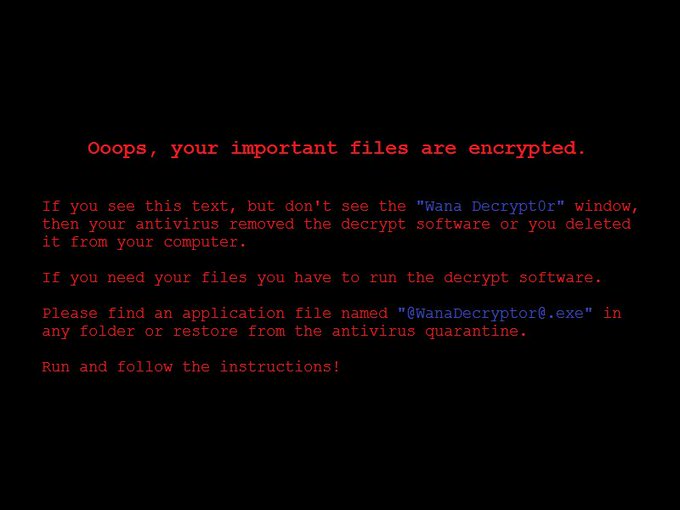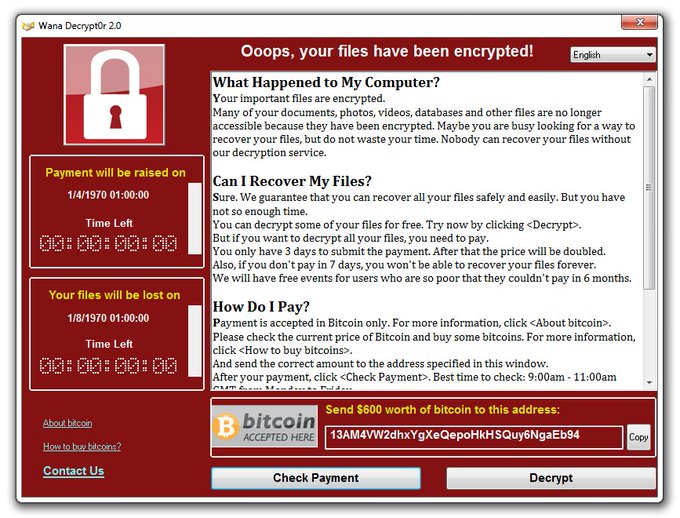WanaCrypt0r 2.0’ malicious software has hit the NHS, some of Spain’s largest companies including Telefonica, as well as computers across Russia, the Ukraine and Taiwan, leading to PCs and data being locked up and held for ransom.
The ransomware has already caused hospitals across England to divert emergency patients – but what is it, how does it spread and why is this happening in the first place?
What is ransomware?
Ransomware is a particularly nasty type of malware that blocks access to a computer or its data and demands money to release it.
How does it work?
When a computer is infected, the ransomware typically contacts a central server for the information it needs to activate, and then begins encrypting files on the infected computer with that information. Once all the files are encrypted, it posts a message asking for payment to decrypt the files – and threatens to destroy the information if it doesn’t get paid, often with a timer attached to ramp up the pressure.
How does it spread?
Most ransomware is spread hidden within Word documents, PDFs and other files normally sent via email, or through a secondary infection on computers already affected by viruses that offer a back door for further attacks.
What is WanaCrypt0r 2.0?
The malware that has affected Telefonica in Spain and the NHS in Britain is the same software: a piece of ransomware first spotted in the wild by security researchers MalwareHunterTeam, at 9:45am on 12 May.
Less than four hours later, the ransomware had infected NHS computers, albeit originally only in Lancashire, and spread laterally throughout the NHS’s internal network. It is also being called Wanna Decryptor 2.0, WCry 2, WannaCry 2 and Wanna Decryptor 2.
How much are they asking for?
WanaCrypt0r 2.0 is asking for $300 worth of the cryptocurrency Bitcoin to unlock the contents of the computers.
Who are they?
The creators of this piece of ransomware are still unknown, but WanaCrypt0r 2.0 is their second attempt at cyber-extortion. An earlier version, named WeCry, was discovered back in February this year: it asked users for 0.1 bitcoin (currently worth $177, but with a fluctuating value) to unlock files and programs.
Will paying the ransom really unlock the files?
Sometimes paying the ransom will work, but sometimes it won’t. For the Cryptolocker ransomware that hit a few years ago, some users reported that they really did get their data back after paying the ransom, which was typically around £300. But there’s no guarantee paying will work, because cybercriminals aren’t exactly the most trustworthy group of people.
There are also a collection of viruses that go out of their way to look like ransomware such as Cryptolocker, but which won’t hand back the data if victims pay. Plus, there’s the ethical issue: paying the ransom funds more crime.
What else can I do?
Once ransomware has encrypted your files there’s not a lot you can do. If you have a backup of the files you should be able to restore them after cleaning the computer, but if not your files could be gone for good.
How long will this attack last?
Ransomware often has a short shelf life. As anti-virus vendors cotton on to new versions of the malware, they are able to prevent infections originating and spreading, leading to developers attempting “Big Bang” introductions like the one currently underway.
Why is the NHS being targeted?
The NHS is not helped by the service’s reliance on old, unsupported software. Many NHS trusts still use Windows XP, a version of Microsoft’s operating system that has not received publicly available security updates for half a decade, and even well-patched operating systems cannot help users who are tricked into running software deliberately.
Attacks on healthcare providers across the world are at an all-time high as they contain valuable private information, including healthcare records.








If you need to hire a real hacker to help spy on your partner's cell phone remotely, change your grades or boost your credit score. Contact this helpline +1 347.857.7580 or the email address expressfoundations@gmail.com
ReplyDelete